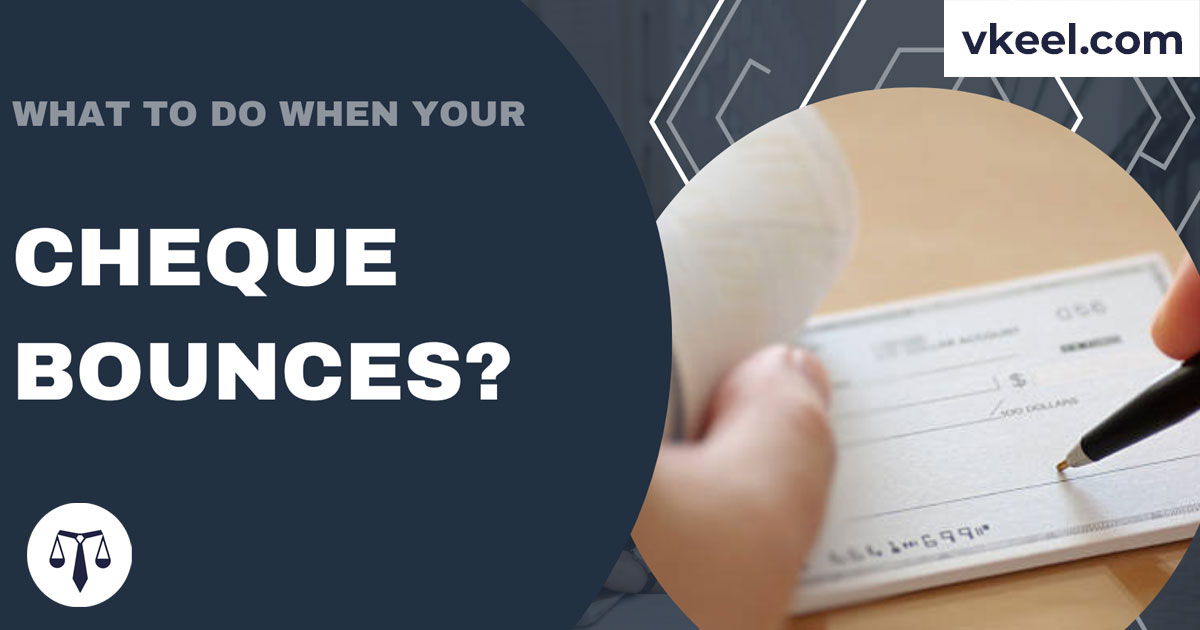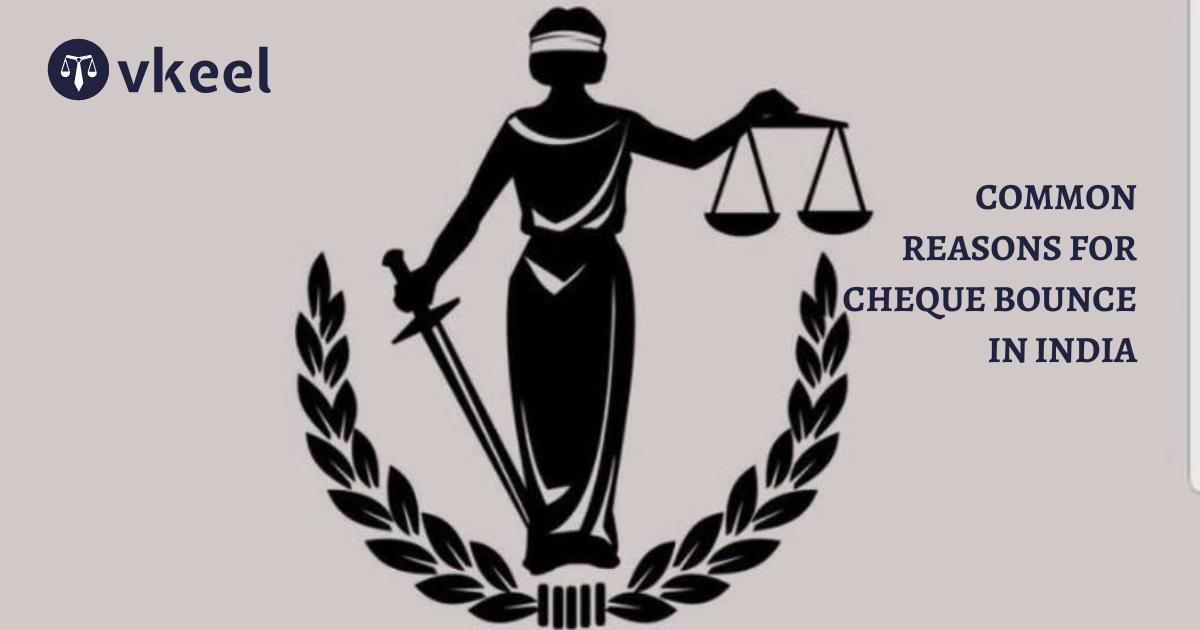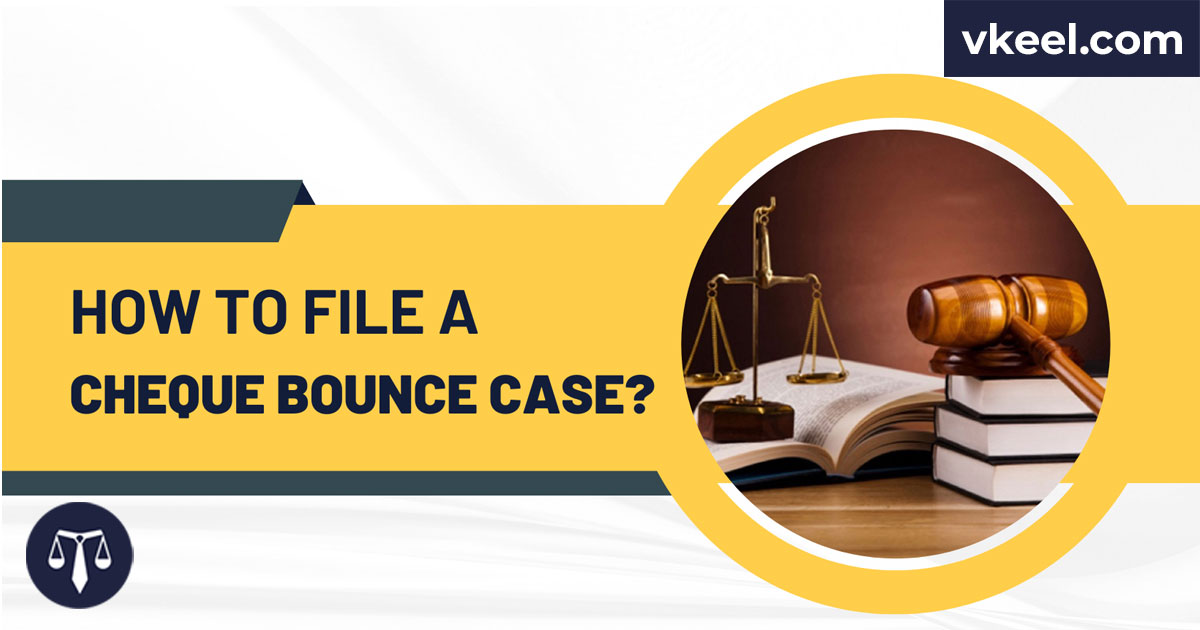What To Do When Your Cheque Bounces?
By Vkeel Team
Table of Contents
- Introduction
- What are the Reasons for Cheque Bounce?
- What are the Steps to Take When Your Cheque Bounces?
- What Are the Penalties for Writing a Bounced Cheque?
- How to Protect Yourself from Bounced Cheques?
- How to Avoid Bouncing a Cheque?
- How to Resolve a Bounced Cheque Dispute?
- What Are the Legal Consequences of a Bounced Cheque?
- Conclusion
Introduction
When you write a cheque, you expect it to be honoured by the bank. Unfortunately, this isn’t always the case. A cheque can bounce for a variety of reasons, such as insufficient funds in the account, a mistake in the cheque amount, or a technical issue with the bank. If your cheque bounces, it’s important to take the right steps to resolve the issue. In this article, we’ll discuss what to do when your cheque bounces, including how to contact the bank, how to handle the situation with the recipient, and how to prevent it from happening again.
What are the Reasons for Cheque Bounce?
A cheque bounce is a situation in which a cheque is returned by the bank due to insufficient funds in the account of the issuer. There are several reasons why a cheque may bounce.
The most common reason for a cheque bounce is insufficient funds. If the issuer does not have enough money in their account to cover the amount of the cheque, the bank will not honour the cheque and it will be returned.
Another common reason for a cheque bounce is an incorrect signature. If the signature on the cheque does not match the signature on file with the bank, the cheque will be returned.
A third reason for a cheque bounce is an expired cheque. If the cheque is more than six months old, the bank will not honour it and it will be returned.
A fourth reason for a cheque bounce is a post-dated cheque. If the cheque is dated for a future date, the bank will not honour it and it will be returned.
Finally, a cheque may be returned if the issuer has closed their account. If the account has been closed, the bank will not honour the cheque and it will be returned.
In all of these cases, the cheque will be returned to the issuer with a note explaining why it was not honoured. It is important to ensure that there are sufficient funds in the account, that the signature is correct, and that the cheque is not expired or post-dated in order to avoid a cheque bounce.
What are the Steps to Take When Your Cheque Bounces?
When a cheque bounces, it is important to take the necessary steps to rectify the situation. Here are the steps to take when your cheque bounces:
1. Contact the person who wrote the cheque: The first step is to contact the person who wrote the cheque and ask them to provide the funds to cover the cheque.
2. Contact your bank: If the person who wrote the cheque is unable to provide the funds, contact your bank and explain the situation. Your bank may be able to provide you with a temporary overdraft to cover the amount of the cheque.
3. File a complaint: If the person who wrote the cheque is unwilling or unable to provide the funds, you may need to file a complaint with the police or a consumer protection agency.
4. Seek legal advice: If the person who wrote the cheque is unwilling or unable to provide the funds, you may need to seek legal advice from best lawyer to determine your rights and options.
5. Take action: Depending on the situation, you may need to take legal action against the person who wrote the cheque. This could include filing a lawsuit or seeking a court order to force the person to pay the amount of the cheque.
By following these steps, you can ensure that you are able to recover the funds from a bounced cheque.
What Are the Penalties for Writing a Bounced Cheque?
Writing a bounced cheque is a serious offence and can result in serious penalties. Depending on the jurisdiction, the penalties for writing a bounced cheque can include fines, jail time, and/or a criminal record.
In some jurisdictions, writing a bounced cheque is considered a criminal offence and can result in a criminal record. Depending on the severity of the offence, the penalties can range from a fine to a jail sentence.
In other jurisdictions, writing a bounced cheque is considered a civil offence and can result in a civil penalty. This can include a fine, restitution, or both.
In some cases, the person who wrote the bounced cheque may be required to pay the amount of the cheque plus any additional fees or interest. In addition, the person may be required to pay the costs of any legal proceedings that may arise from the bounced cheque.
It is important to note that the penalties for writing a bounced cheque can vary depending on the jurisdiction. It is important to consult with a lawyer to determine the specific penalties that may apply in your jurisdiction.
How to Protect Yourself from Bounced Cheques?
Bounced cheques can be a major source of financial distress. To protect yourself from bounced cheques, it is important to take certain precautions.
First, always ask for a post-dated cheque when accepting payment. This will ensure that the cheque is not presented for payment until the agreed upon date.
Second, always check the validity of the cheque before accepting it. Make sure that the cheque is not post-dated, that the cheque is signed, and that the cheque is not stale-dated.
Third, always ensure that the cheque is drawn on a reputable bank. If the cheque is drawn on a bank that you are unfamiliar with, it is best to contact the bank to verify its validity.
Fourth, always keep a record of the cheque. Make sure to keep a copy of the cheque and the details of the transaction. This will help you to track the cheque and take action if it is not honoured.
Finally, if you receive a bounced cheque, take action immediately. Contact the issuer of the cheque and ask for payment. If the issuer is unable to pay, you may need to take legal action.
By following these steps, you can protect yourself from bounced cheques and the financial distress they can cause.
How to Avoid Bouncing a Cheque?
Writing a bad check, or bouncing a cheque, is a serious offense that can have serious consequences. To avoid this, it is important to understand the basics of writing a cheque and to take steps to ensure that the cheque will not bounce.
First, make sure that the cheque is written correctly. This includes writing the correct date, the correct payee, the correct amount in both numbers and words, and signing the cheque. It is also important to make sure that the cheque is written on a valid account with sufficient funds.
Second, it is important to keep track of all cheques that have been written. This includes keeping a record of the cheque number, the date it was written, the payee, and the amount. This will help to ensure that all cheques are accounted for and that there are sufficient funds in the account to cover them.
Third, it is important to keep an eye on the account balance. This will help to ensure that there are sufficient funds in the account to cover any cheques that have been written. If the balance is getting low, it is important to deposit additional funds into the account to cover any outstanding cheques.
Finally, it is important to be aware of any fees associated with writing a cheque. Some banks may charge a fee for writing a cheque, and this should be taken into account when writing a cheque.
By following these steps, it is possible to avoid bouncing a cheque. Taking the time to understand the basics of writing a cheque and keeping track of all cheques that have been written can help to ensure that all cheques are accounted for and that there are sufficient funds in the account to cover them.
How to Resolve a Bounced Cheque Dispute?
A bounced cheque dispute can be a difficult and time-consuming process to resolve. However, there are steps that can be taken to ensure a successful resolution.
First, it is important to understand the legal implications of a bounced cheque. Depending on the jurisdiction, a bounced cheque may be considered a criminal offence. It is important to be aware of the laws in your area and to take the necessary steps to ensure that the dispute is resolved in a legal manner.
Second, it is important to contact the issuer of the cheque. The issuer should be informed of the bounced cheque and the reasons for the dispute. It is important to be polite and professional when communicating with the issuer. It is also important to provide any evidence that may be relevant to the dispute.
Third, it is important to contact the bank that issued the cheque. The bank should be informed of the dispute and the reasons for the dispute. The bank may be able to provide additional information that can help to resolve the dispute.
Fourth, it is important to contact a lawyer or other legal professional. A lawyer or other legal professional can provide advice on the best course of action to take in order to resolve the dispute.
Finally, it is important to be patient and persistent. Resolving a bounced cheque dispute can take time and it is important to remain patient and persistent in order to ensure a successful resolution.
What Are the Legal Consequences of a Bounced Cheque?
A bounced cheque, also known as a dishonoured cheque, is a cheque that cannot be processed due to insufficient funds in the account of the person who wrote the cheque. The legal consequences of a bounced cheque depend on the jurisdiction in which the cheque was written.
In some jurisdictions, a bounced cheque may be considered a criminal offence. Depending on the severity of the offence, the person who wrote the cheque may face criminal charges, including fines and/or imprisonment. In other jurisdictions, a bounced cheque may be considered a civil offence, and the person who wrote the cheque may be liable for damages.
In most jurisdictions, the person who wrote the cheque is responsible for covering the amount of the cheque, plus any associated fees. The person who wrote the cheque may also be responsible for any legal fees incurred by the person who received the cheque.
In some jurisdictions, the person who wrote the cheque may be required to pay a penalty for writing a bounced cheque. This penalty may be in addition to the amount of the cheque and any associated fees.
In some jurisdictions, the person who wrote the cheque may be required to pay interest on the amount of the cheque. This interest may be calculated from the date the cheque was written until the date the cheque is paid in full.
In some jurisdictions, the person who wrote the cheque may be required to pay a fee to the bank for processing the bounced cheque. This fee may be in addition to the amount of the cheque and any associated fees.
In some jurisdictions, the person who wrote the cheque may be required to pay a fee to the person who received the cheque. This fee may be in addition to the amount of the cheque and any associated fees.
In some jurisdictions, the person who wrote the cheque may be required to pay a fee to the court for processing the bounced cheque. This fee may be in addition to the amount of the cheque and any associated fees.
The legal consequences of a bounced cheque vary from jurisdiction to jurisdiction. It is important to consult with a lawyer to determine the specific legal consequences of a bounced cheque in your jurisdiction.
Conclusion
When your cheque bounces, it is important to take action quickly to avoid any further complications. You should contact the person who wrote the cheque and ask them to provide a new cheque or an alternative form of payment. If the cheque writer is uncooperative, you may need to take legal action. It is also important to review your banking records to ensure that the cheque was not a mistake. Finally, you should contact your bank to discuss the situation and to ensure that the cheque is not re-presented. Taking these steps can help you resolve the issue quickly and avoid any further complications.
Disclaimer:
The information provided in the article is for general informational purposes only, and is not intended to constitute legal advice or to be relied upon as a substitute for legal advice. Furthermore, any information contained in the article is not guaranteed to be current, complete or accurate. If you require legal advice or representation, you should contact an attorney or law firm directly. We are not responsible for any damages resulting from any reliance on the content of this website.






